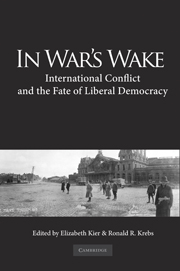Book contents
- Frontmatter
- Contents
- List of Contributors
- Acknowledgments
- 1 Introduction
- PART I WAR AND DEMOCRATIC TRANSITIONS: NEW AND DURABLE DEMOCRACIES?
- 2 Does War Influence Democratization?
- 3 Dodging a Bullet
- 4 Armed Conflict and the Durability of Electoral Democracy
- PART II WAR AND DEMOCRATIC PUBLICS: RESHAPING POLITICAL PARTICIPATION?
- PART III WAR AND DEMOCRATIC STATES: GOVERNMENT BY THE PEOPLE OR OVER THE PEOPLE?
- References
- Index
4 - Armed Conflict and the Durability of Electoral Democracy
Published online by Cambridge University Press: 05 June 2012
- Frontmatter
- Contents
- List of Contributors
- Acknowledgments
- 1 Introduction
- PART I WAR AND DEMOCRATIC TRANSITIONS: NEW AND DURABLE DEMOCRACIES?
- 2 Does War Influence Democratization?
- 3 Dodging a Bullet
- 4 Armed Conflict and the Durability of Electoral Democracy
- PART II WAR AND DEMOCRATIC PUBLICS: RESHAPING POLITICAL PARTICIPATION?
- PART III WAR AND DEMOCRATIC STATES: GOVERNMENT BY THE PEOPLE OR OVER THE PEOPLE?
- References
- Index
Summary
How do the legacies of armed conflict affect new democracies? This chapter focuses on a small part of this larger question. It examines an intriguing puzzle that emerges from the statistical analysis of the entire set of new electoral democracies emerging between 1946 and 2001. Briefly put, the puzzle is this: Democracies that emerge during or after armed conflict tend to last longer than democracies that emerge in peacetime.
Why would democracies emerging during or after conflict enjoy this advantage? There are good reasons to expect the opposite outcome – that is, that conflict democracies, as I call them, would be less likely to endure. Careful scholars have shown us that war and violence often undercut the sense of trust that workable democracy requires. Yet, the durability advantage withstands statistical controls for level of development, past democratic experience, regional effects, and other variables we normally associate with democratic longevity. In fact, the probability of a democracy enduring or failing is affected more by this historical variable than by most others.
To argue that conflict democracies have a durability advantage is not to argue that war, or armed conflict more generally, leads to democracy. Quite the contrary, in keeping with the argument made by Edward D. Mansfield and Jack Snyder (Chapter 2), the research that exposes the durability puzzle concludes that there is no clear association between armed conflict and the emergence of democracy.
- Type
- Chapter
- Information
- In War’s WakeInternational Conflict and the Fate of Liberal Democracy, pp. 67 - 94Publisher: Cambridge University PressPrint publication year: 2010
- 17
- Cited by



